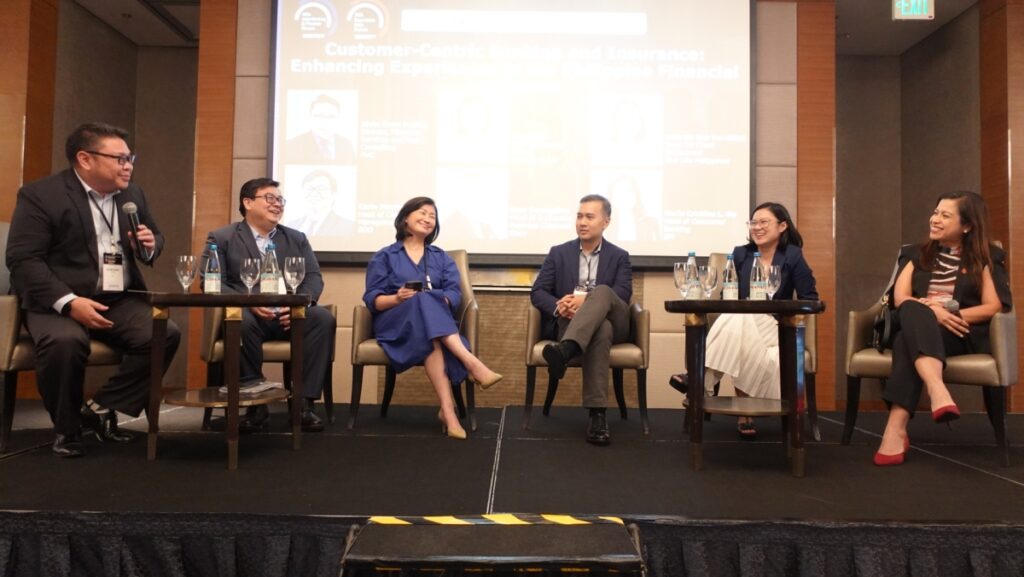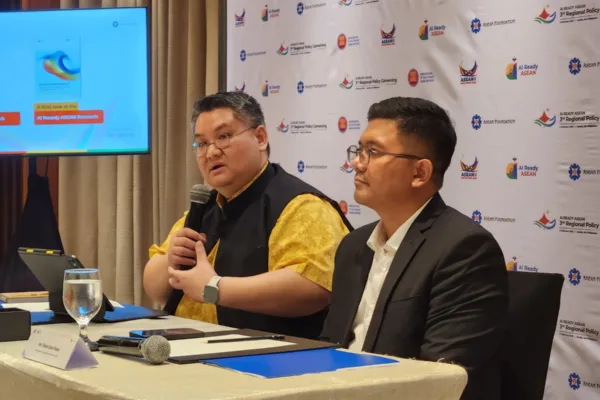The banking sector, including insurance companies and the entire Philippine financial services sector, is now undergoing a significant transformation driven by the need to deliver hyper-personalized, data-driven experiences to meet rapidly evolving customer expectations.

Moderator Alvin Dave Pusing (leftmost, with mic) of PwC exchanges ideas with the other speakers at the “Asian Banking & Finance and Insurance Asia Summit“
This shift was the focal point of the recently concluded “Asian Banking & Finance and Insurance Asia Summit” held earlier this month at the Makati Shangri-La Hotel, where industry leaders gathered to discuss the challenges and opportunities presented by this new frontier in customer service.
Moderated by Alvin Dave Pusing, Director of Financial Services and Risk Consulting at PwC, the summit brought together 286 attendees from across the banking and insurance sectors.
During the discussions, several experts emphasized the critical role of unified customer data, automation, and maintaining personal relationships in shaping a more customer-centric future for financial institutions.
Banking sector: Putting “customer obsession” at the core
One of the highlights of the event was the emphasis on “customer obsession,” which Maria Cristina L. Go, Head of Consumer Banking at Bank of the Philippine Islands (BPI), described as follows: “Being customer-obsessed means proactively anticipating customer needs and leveraging data and technology to deliver experiences that go beyond what the customers expect,” she stated.
“At BPI, we don’t just aim for customer-centricity — we strive for customer obsession,” Go further stated.
Similarly, Tricia Tan, Chief Marketing Officer at Security Bank, echoed this sentiment, saying, “We want to be the most customer-centric bank in the Philippines, at least for the customers that we serve.”
This commitment to personalization is what’s currently driving banks like Security Bank to redesign their processes, from marketing to product development, with a singular focus on the customer.
The power of data in personalization

Personalization at scale has become a top priority for financial institutions, with unified customer data forming the backbone of this approach. “Unified customer data is the starting point,” said Tan.
Without the seamless integration of customer data across multiple channels — whether apps, websites, or branches — financial institutions face challenges in identifying customer preferences and offering tailored services.
BPI has already implemented a 360-degree view of its customers, enabling the bank to better understand their demographic and transactional data.
“We’ve had a 360-degree view of our customers for a long time, which helps us understand not just their demographic data but also transactional data,” Go explained. “By harnessing this data, BPI can offer targeted marketing, pre-qualify clients for financial products, and even predict behaviours like potential churn.”
Balancing data and human relationships

While data and technology play a crucial role in personalization, the human element remains indispensable, particularly in institutional banking.
Carlo Nazareno, Head of Cash Management Services at BDO, highlighted the importance of building deep, personal relationships with decision-makers within institutions.
“Institutional banking relies on understanding the individuals behind the decisions,” Nazareno said. For banks working with smaller enterprises or first-generation startups, establishing trust with key stakeholders is essential to providing tailored financial solutions that meet their unique needs.
Nazareno noted that banks must start small with their clients, offering basic services such as a chequebook or online banking, and progressively scale up as the relationship develops. “Understanding where the client is in their treasury transformation journey allows us to tailor solutions to their specific needs,” he added.
The role of automation in personalization
Automation is another critical factor in enabling personalization at scale.
According to Tan, banks need automated processes in place to manage large volumes of customers and personalize interactions effectively. “Without automation, personalizing at scale would be impossible,” she said.
Automation tools, such as marketing platforms that create personalized nudges based on unified customer data, enable banks to seamlessly integrate personalization across multiple touchpoints.
These tools allow for real-time engagement with customers, further enhancing their experience.
In 2022, to ensure the removal of the Philippines from the global “dirty money” watchlist, the Bangko Sentral ng Pilipinas (BSP) released a circular calling for a freeze order against assets and funds related in any way to terrorist and proliferation financing.
The importance of innovation and experimentation
The panellists also emphasized the need for continuous innovation and experimentation in personalizing services. Isabela Rae Ver-Bibal, Head of Client Experience at Sun Life Philippines, shared that their team is focused on “insights activation programs,” where they collaborate directly with clients to co-design products and services based on real-time feedback.
“It’s about building the muscle to ask the right questions and having the tools to experiment and fail fast,” Ver-Bibal explained. This iterative process allows companies like Sun Life to quickly adapt and innovate, ensuring that they remain responsive to customer needs.
As the financial services landscape becomes increasingly competitive, customer-centricity has evolved from being merely a strategy to a necessity for survival.
Whether through leveraging data, fostering personal relationships, or embracing technology, banks and insurers in the Philippines are focused on creating more personalized, seamless, and efficient customer experiences.
“In the end, it’s about understanding the client’s position in their business and offering solutions that fit their unique needs,” ended Nazareno, encapsulating the collective vision of the industry experts present at the summit.







